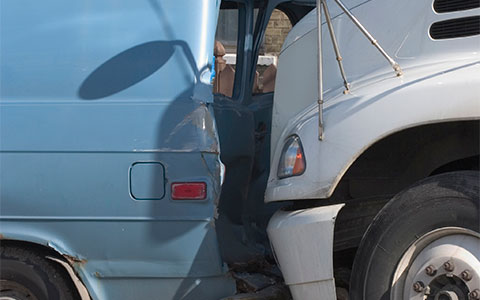Trucking Podcast: Litigation Mitigation Topics

Litigation against a trucking company can be devastating to a business. The trend of juries awarding huge verdicts continues. A trucker’s relentless focus on road safety best practices like minding speed and distance, can be a game changer.
Learn from the examples of other trucking companies that have been hit with nuclear verdicts and how to reduce the risk to your trucking business by strengthening your safety practices with guidance from Northland’s Trucking Litigation Mitigation episodes on Freightwaves What the Truck?!? podcast.
Nuclear verdicts in the trucking industry
Join Anthony Slamar on this episode of What the Truck?!?. Anthony discusses the impact of high damage jury awards against trucking companies, and how regular driver coaching can help avoid the accidents that may result in nuclear verdicts.
Aired: 4/26/2024
Paid Content
(DESCRIPTION)
Logo, What the Truck? The host of the What the Truck podcast is featured on the left, at a desk with action figures and model vehicles. He wears a baseball cap with an orange T on it, and has glasses and a beard and mustache. A bar along the top reads, Subscribe, and has icons for YouTube, LinkedIn, Facebook, an icon with an I with circles around the dot, an icon with three slashes, Spotify, TikTok, and X. On the right is a menu that lists Today's Show, Nooner with Dooner, On Deck, Matthew Leffler, Non-Competes and the Freight Industry, and Meanwhile, with Meanwhile highlighted. There is a QR code on the bottom right, and across the very bottom of the screen run real-time Headlines.
(SPEECH)
TIMOTHY DOONER: Right now, Anthony Slamar, Risk Control Transportation Specialist at Northland Trucking Risk Control. Hello, Anthony.
(DESCRIPTION)
The menu at the right changes to Anthony Slamar. Nuclear Verdicts. Rocky Top on the Rise. University of Tennessee. Global Supply Chain Institute. Anthony Slamar is highlighted. The top right displays the logo, Northland Insurance. The podcast host's screen splits to include Anthony's screen. He is bald and has a short beard and mustache, and wears glasses. He sits in an office chair with a headset on.
(SPEECH)
ANTHONY SLAMAR: Hey. How are you doing? Good to be here.
TIMOTHY DOONER: Good. Yeah, good to have you back. Can you hear me OK?
ANTHONY SLAMAR: Yeah. Yeah, I can hear you just fine.
TIMOTHY DOONER:
(DESCRIPTION)
Headline text, China e-commerce exports, unreliable Red Sea shipping boost air cargo - Resurgent air cargo demand and rising rates, powered by the quasi-blockade of Red Sea shipping and continued growth in bookings by Chinese e-commerce platforms, during a normally slow shipping period is creating high expectations among air carriers for peak season and making logistics providers nervous about securing adequate capacity.
(SPEECH)
1. Well, hey, welcome back to the show. Welcome back to the show. One of the things that we're talking about today, very, very important topic, is the trend in nuclear verdicts. There's actually even a headline on FreightWaves right now talking about this topic and the statistics. I'm very excited to jump in on it with you.
ANTHONY SLAMAR: Yeah, absolutely. So, hey, good to be here again. Nuclear verdicts, very important trend within the transportation industry, kind of a growing concern and a lot of regards. What a nuclear verdict is, it's essentially when a jury awards exceed $10 million or more.
(DESCRIPTION)
Text, Anthony Slamar, Risk Control, Transportation Specialist, Northland Trucking Risk Control.
(SPEECH)
When we look at this-- when we look at the last nine years of data, we've actually seen a 1,000% increase in verdicts related to truck crashes. So this is a hugely important topic to talk about.
(DESCRIPTION)
Headline text, Will Shein help propel Flexport's future? - Global fashion retailer Shein's latest announcement on LinkedIn revealed that its U.S. marketplace merchants can now integrate with Flexport's fulfillment services, a move expected to drive growth for Flexport.
(SPEECH)
Knowing this information, what we want to do is we don't want to have fear. We want to look at this.
We want to say to ourselves, how can we as an organization improve our fleet safety posture? How can we look at different driver training and coaching opportunities? How can we look at the improvement of our fleet safety program? And again, we want to be as safe as possible out there on the road.
(DESCRIPTION)
Headline text, Borderlands Mexico: Experts push infrastructure to boost cross-border trade - With nearshoring accelerating trade growth between the U.S. and Mexico, experts said both countries need to focus on infrastructure, technology, policies, and cargo security to keep goods flowing seamlessly.
(SPEECH)
TIMOTHY DOONER: Yeah. Hey, I like where you're going with this. You mentioned astronomical jury awards. Can you give an example of something like that?
(DESCRIPTION)
The right menu highlight changes to Nuclear Verdicts.
(SPEECH)
ANTHONY SLAMAR: Yeah, absolutely. So every year, there's a report that comes out. It's called the Top 100 Verdicts in the United States. Essentially, it covers significant awards by juries. Two examples come to mind. One of them involved an intersection accident. In this particular instance, there was a tractor trailer that broadsided an SUV. Jury awarded $70 million in that case.
(DESCRIPTION)
Headline text, Arkansas authorities bust truck driver accused of hauling illegal cigarettes - A truck driver was arrested in Arkansas after authorities say they discovered nearly 28,000 packs of untaxed cigarettes in his vehicle.
(SPEECH)
Another example would include a rear-end collision, this time involving a nurse. Jury awarded over $40 million in that case. So these are obviously significant dollar amounts. Without going into all the details of the cases, it's important to understand what these are.
(DESCRIPTION)
Headline text, One long trip: XPO driver achieves 4M accident-free miles - Four million miles. That's roughly 160 trips around the world, or eight-and-a-half trips to the moon and back. Dale Williams, 65, may not be a jet pilot or astronaut, but he's certainly matched distances traveled in both professions over the course of his nearly 37-year career with XPO. Earlier this month, XPO celebrated the Army veteran for driving 4 million miles.
(SPEECH)
It's important to understand that despite no matter what size company you have, if it's a small fleet, midsize fleet, or large fleet, these represent significant losses that the company has to encounter. So ultimately, we want to look at this. And we want to ask ourselves, how can we make our organization better?
TIMOTHY DOONER: Yeah, and important words. Well, how can we, how can I coaching and driver training help make a fleet better here and prevent some of all this?
ANTHONY SLAMAR: Yeah, for sure. So let's use the two examples we just talked about, intersections and rear-end collisions. Let's talk about intersections first. Intersections, obviously, represent a more higher risk out there on the road.
(DESCRIPTION)
Headline text, How to prepare for CVSA International Roadcheck 2024 - The Commercial Vehicle Safety Alliance's (CVSA) International Roadcheck is coming up next month. It is a high-visibility, high-volume inspection and compliance enforcement initiative, and carriers should begin preparing now to avoid racking up unexpected violations. This three-day Roadcheck -- which takes place in Canada, Mexico, and the United States -- is scheduled for May 14 to 16.
(SPEECH)
People are turning left. They're turning right. They're slowing down. They're speeding up. They're stopping. They're turning in front of you. All different types of things happen in an intersection. This represents a really good training opportunity for our drivers. Throughout the year, we should be providing training in a variety of topics. And intersection safety would be an excellent opportunity to review that with drivers.
Rear-end collisions. A lot of rear end collisions are related to speed and space management and also distracted driving. And it's good that we're talking about this, especially during this month, which is Distracted Driving Awareness Month. So speed and space management, really good things to reiterate with our drivers throughout the year.
(DESCRIPTION)
Headline text, Philadelphia CDL school owner sentenced to prison for licensing scheme - A former CDL school owner in Philadelphia was sentenced to nearly five years in prison for bribing a CDL exam administrator to pass students who didn't take the exam. Vladimir Tsymbalenko, 53, who owned Vlad's CDL School, was sentenced to four years and nine months in federal prison and three years of supervised release by U.S. District Court Judge Jeffrey L. Schmehl. He was also fined $5,000.
(SPEECH)
In addition to driver coaching, training, we may have some technologies that are available to us. One of those would include telematics. A lot of companies are using telematics these days. Essentially, telematics company is going to provide you with what's called a driver scorecard.
So this is information based on driver's behavior. It can highlight risky driving behavior that you might not want to have occur in your fleet. It's important to use this information. OK, that's really big.
Keep in mind, you're paying per truck per month for this information. So however you have it established between you and the telematics company, whether it's an email, an alert on your phone, or through the telematics website, you want to use that information and address risky driving behavior. Examples could include speeding, hard braking, hard cornering, things like that.
(DESCRIPTION)
Headline text, Tough trucking market hits EBITDA at TriumphPay; other indicators up - In his quarterly note to shareholders, Triumph Financial CEO Aaron Graft predicted that the headline on the earnings might be "TriumphPay swung to a loss this quarter" -- one quarter after that growth segment at the trucking-focused bank had become EBITDA-positive.
(SPEECH)
Another technology that a lot of vehicles are equipped with is ADAS, A-D-A-S, advanced driver-assistance systems. These include precollision assist, lane-keeping assist, alerts, and warnings that occur inside the cab of the vehicle to alert the driver if the vehicle thinks you're going to come into contact with something or if a crash is imminent. So all these types of things we can really use to improve our overall safety posture out there on the road.
TIMOTHY DOONER: Anthony, very good. Any examples we missed there? And if not, where can people go learn more about this and get more info from your team?
(DESCRIPTION)
Headline text, Switcheroo: EV Realty secures electricity before launching charging sites - Startups, real estate giants and others developing electric truck charging sites tend to pick locations before being certain they can get electricity in a timely fashion. Startup EV Realty prioritizes having the juice available when it buys a property.
(SPEECH)
ANTHONY SLAMAR: Yeah, another example that comes to mind involves a award that was actually over $240 million.
TIMOTHY DOONER: Whoa.
ANTHONY SLAMAR: This one involved a fatality, unfortunately, so a big loss that the company had to incur.
(DESCRIPTION)
Text, Anthony Slamar, Risk Control, Transportation Specialist, Northland Trucking Risk Control.
(SPEECH)
This one happened when a vehicle was at the point of delivery backing up their vehicle. The trailer was blocking oncoming traffic. A vehicle came by, struck the trailer, and unfortunately, the motorist died.
(DESCRIPTION)
Headline text, Freight brokerages struggle through a long trough - The freight winter that sent Surge into bankruptcy and shut down Convoy isn't over yet, even if the bottom is likely in. Tender rejection rates are hovering around 4%, indicating that capacity is still loose and that asset-based carriers aren't in a position to reject contracted freight.
(SPEECH)
So a big part of trucking-- we all know this-- is trip planning, route selection. So we always talk about what happens from point A to point B. But we also want to talk about what happens at point B right at the point of delivery.
We want to talk about how to safely position our vehicle. We want to talk about how to reduce risks when we're doing that so we're not posing additional hazards to other motorists out there on the road. And we have a lot of great resources on our website, Northland Insurance. Our website is northlandins.com. That's northlandins.com.
We have a ton of trucking resources, a ton of safety material for people to look at.
(DESCRIPTION)
Headline text, Gartner critiques real-time-visibility market players - Technology research and consulting firm Gartner recently released its Real Time Transportation Visibility Platform (RTTVP) report, highlighting the space's top performers while suggesting areas for improvement.
(SPEECH)
We love trucking. It's what we do at Northland Insurance. We love the trucking industry. We have a group of outstanding safety professionals that meet with our customers every week. And fleet safety is what we do. And we love it.
TIMOTHY DOONER: Thank you. I believe you. Thank you so much for your insights today. Nuclear verdicts, a trend that's not going away.
(DESCRIPTION)
Headline text, Bad news at Marten: Profits miss expectations, truckload O.R. plummets - Truckload carrier Marten Transport added to this week's trucking earnings calamity, coming in short of consensus on first-quarter earnings, headline cuts off.
(SPEECH)
This was a shot. If you want the chaser on this, John Gallagher has a great article up.
Here is just one stat. It blew me away because you mentioned that $240 million award. People go, wow, that's crazy. But look at this number. In 2022, crashes in the US resulted in 494 deaths and over $5.5 billion in costs. This is not going away. Go check out his site. Go get that information. Anthony, thank you so much.
ANTHONY SLAMAR: Hey. Thanks for having me. I appreciate it.
TIMOTHY DOONER: Take care.
Speed and space management in trucking
Keeping your trucks on the road means steering clear of issues that could result in downtime like out of service safety inspections. Join Northland Risk Control Specialist Anthony Slamar on this episode of What the Truck?!? about the Inspection Selection System and strategies for following good speed and space management.
Aired: 5/10/2024
Paid Content
(DESCRIPTION)
Timothy Dooner, Anthony Slamar, and Matt McClelland appear side-by-side, each speaking to us from their own locations. Logos, What the Truck?!?, Redwood, and Northland Insurance. Across the top, text, Subscribe. Logos, YouTube, Linked In, Facebook, Apple Podcasts, Spotify, TikTok, X. The right menu, titled Today's Show, has a list including, Anthony Slamar, which is highlighted, Speed and Space, Take your tiny trucker to work day, Andrew Lockwood, and Cargo Theft Ring in California? Timothy speaks first.
(SPEECH)
TIMOTHY DOONER: Right now, let's visit with Anthony Slamar, Risk Control Specialist, Northland Trucking Risk Control. Welcome back to the show, Anthony.
ANTHONY SLAMAR: Hey, thanks for having me. It's always a pleasure to be here.
TIMOTHY DOONER: And in case you haven't met, this is Matt McClelland from Covenant, the pretty big fleet out there. So he's going to listen to our conversation, help me cohost a little bit. And I believe our conversation today is going to be a little bit about speed and space management.
ANTHONY SLAMAR: Yeah. Hey, for sure. So this is a hugely important subject in the trucking industry, right? And
(DESCRIPTION)
Speed and Space is highlighted in the left menu. Text, Anthony Slamar: Risk control transportation specialist, Northland Trucking Risk Control.
(SPEECH)
when we talk about this, we're really talking about behaviors relating to speed and space management. And it's important to understand that this doesn't just apply for truck drivers, but this applies to all drivers in general out there. So it's a really important thing to talk about, because ultimately, we want to reduce our chances of accidents.
TIMOTHY DOONER: Of course, of course. So what are what are some of these—what are some of these behaviors in a more specific way?
ANTHONY SLAMAR: Yeah. So think about—driving becomes second nature to a lot of us, right? We get in the vehicle, we turn on the ignition, and we drive. But there's a lot of vehicles in front of us, behind us, and all different types of things out there on the road.
When we talk about truck drivers, we all know the six-second rule, right? And that's generally the safe stopping distance that it takes for a truck driver to safely stop their vehicle. And keep in mind, there's a lot of factors on the road that affect this. Density of traffic, the speed of traffic, things like that, drivers doing unsafe acts.
And we all know this. The average driver out there, they have no idea how long it takes a truck driver to safely stop their vehicle. And so that's why it's really important to talk about this with our drivers and also make sure our drivers are paying attention to these things, and also reckless driving out there from other motorists as well.
TIMOTHY DOONER: Well, let's dig in. Aren't truck drivers trained on these factors?
ANTHONY SLAMAR: Yeah, for sure. A lot of truck drivers receive some really good training on this. And at Northland Insurance, we love meeting with our customers, we love talking about fleet safety. We cover all aspects of the trucking industry.
We talk about flatbed operations, driving operations, reefer trailers, everything. And we hear from a lot of our customers that—or we hear from a lot of trucking companies in general that they're doing a really good job with providing their drivers that training. And that's crucial. It's huge.
And so we really want to emphasize to truck driver—or no, to trucking companies, to talk about these things with their drivers, because it shows your level of commitment to fleet safety, and drivers really appreciate that. And it's also important to talk about things such as a driver's physical needs, too, such as proper rest, proper nutrition, things like that.
When we talk about training, too, a lot of companies are incorporating what's called defensive driver training. National Safety Council puts out a lot of good information on this every year. National Safety Council is a nationwide organization that covers safety for a large variety of industries, including the transportation industry. They have a formal defensive driver program.
And a lot of trucking companies will send their drivers through this, especially drivers involved in accidents. And these programs are designed to address things that are related to truck-related accidents and talks about things like speed and space management, things that are really important to understand out there, such as improper lane change, improper turning, right of way, things like that.
Companies are also talking a lot about distracted driving now. That's a huge topic. Last month was—
TIMOTHY DOONER: It was just awareness month.
ANTHONY SLAMAR:—awareness month.
TIMOTHY DOONER: It was just Distracted Driving Awareness Month.
ANTHONY SLAMAR: Yeah, yeah. Absolutely. And if you think about it, distracted driving, that really affects your speed and space management. It takes attention away from something that you—from those things that you really want to pay attention to. So a lot of companies out there are really incorporating good safety policies that address distracted driving because they know how much it affects speed and space management.
TIMOTHY DOONER: So Matt, you're driving down the highway, I'm driving down the highway. We control ourselves. We can do our best to control ourselves. But what about the other drivers out there that are cutting us off and making dangerous moves?
ANTHONY SLAMAR: Outstanding question. Outstanding question. A lot of the times, we might hear from our drivers, OK, hey, I'm doing the right thing, but the motorists out there are causing a lot of the accidents. And that can be understandable.
What we want to communicate to our drivers is that it's important to take responsibility for what you can control, such as your own speed and space management. Really important, OK. Keep in mind, when we talk about speeding, that can also result in a monetary citation from law enforcement.
Every year, or on a regular basis, trucking companies are always looking at their SAFER scores under the safety management system. These are percentages based on vehicle out of service, driver out of service, hazmat.
Trucking companies generally want to be below the national average to make sure that they have the best safety posture as possible. And these percentages are based on categories such as unsafe driving, vehicle maintenance, driver fitness, controlled substances, hours of service, that type of thing. And under the category of unsafe driving is where speeding comes into play.
So think about it. If you get pulled over for speeding, it could open up the door for an hours-of-service violation or a vehicle maintenance violation, which could possibly be an out-of-service violation, which is going to take you off the road for a longer duration of time. That's less time you have to transport your cargo to its destination. And so that's why we always want to emphasize doing the right thing with our drivers, such as good pretrip inspections, vehicle maintenance, making sure we're following hours-of-service rules, as well as speeding.
TIMOTHY DOONER: Now let me ask you something here. So training—and I'm thinking back, too. This is a callback to our last episode. We were talking about fleet pain points. And the number one rise in fleet pain points was the training of inexperienced drivers. Let me ask you about that. How are fleets training drivers right now, especially if there's so many inexperienced ones?
ANTHONY SLAMAR: Yeah, really good question. So here's the thing to approach—here's how we can approach this. Whether we are talking about new drivers or experienced drivers, successful trucking companies know that having those good policies in place is important. Again, it shows your commitment to safety to those drivers. And like we talked about before with the National Safety Council putting out a defensive drivers program, also talking about distracted driving, these type of things are really important for drivers, and it goes a long way.
TIMOTHY DOONER: Well, before I let you go, what message do you have to deliver to your customers or potential customers on this?
ANTHONY SLAMAR: Yeah. Like I said before, we love meeting with our customers. We love talking about these things. It's what we do at Northland Insurance. We really love talking to customers about fleet safety.
We would just encourage them. Continue on with your training, continue on with your policies. Make sure you're looking at your SAFER scores on a regular basis, and looking at trends. Things like that.
TIMOTHY DOONER: Hey, thank you so much. Everyone, check out Northland Trucking Risk Control. Anthony over here will help you out.
(DESCRIPTION)
Matt holds up his phone to us and takes a picture.
(SPEECH)
MATT MCLELLAND: I'm going to take his picture.
TIMOTHY DOONER: Take his picture.
MATT MCLELLAND: We may give him a call. Yeah. OK.
TIMOTHY DOONER: Well, hey, it was nice to meet you, Anthony, man. Say, hi—Say, bye.
(DESCRIPTION)
Matt waves.
(SPEECH)
Take care.
ANTHONY SLAMAR: Nice to meet you, sir.
TIMOTHY DOONER: Have a great weekend.
ANTHONY SLAMAR: All right.



